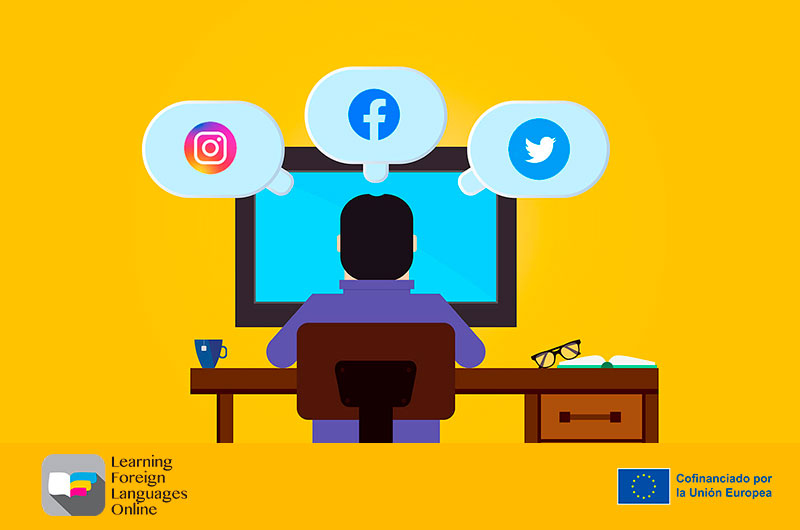Because of its interest and relation to language learning we share in our blog this article by Kelsea Mucherino, Erasmus coordinator of Eurospeak, one of the partners participating in Learning Foreign Languages Online (LFLO), originally published on the project’s website.
Learning languages online: how to learn a language without access to a native speaker
How can we learn to communicate without interacting?
By Kelsea Mucherino
In the course of the COVID-19 pandemic, there has been a widespread loss of jobs across Europe, leading thousands of people to seek employment. This has led to a massive increase in the number of people who have decided to undertake the daunting task of improving their foreign language skills by learning languages online. This is backed up by evidence from Google, between the start of the pandemic and now:
- “Language learning with YouTube” has increased by 750%.
- “Language learning solutions” by 450%.
- “Better language learning tools” by 300%.
- “Learning languages with Netflix” by 250%.
By now, many people have realized that having a foreign language up your sleeve can be a competitive advantage when applying for jobs, and it also opens up the possibility of working remotely (or even face-to-face, eventually) around the world. Therefore, it is not surprising that many people have tried to do so while there were restrictions and they were glued to the screens of their electronic devices.
Unfortunately, learning languages online, knowing how to communicate in a foreign language without human interaction, is very difficult. Even with all the time and motivation in the world, it is not an easy task to learn a foreign language without being immersed in the language or having access to native speakers to practice the skills. Even if you memorize a lot of vocabulary words and grammar rules, it will not be enough to be able to communicate in a foreign language. Language learning is interactive in nature, but what do we do when the “interaction” piece is missing?
Fortunately, it is quite possible to hone communication skills even without being in the presence of someone with whom you can practice. Even if you are currently taking foreign language classes, you may find it especially difficult to put into practice what you have learned outside of class. Below is an activity you can do on your own to develop communication skills in a foreign language using the resources available to you.
Before you start practicing languages online, it is important to keep in mind that successful communication requires a different part of your brain than the one that stores knowledge of grammar and vocabulary and therefore requires you to use different “study” techniques while learning. We strongly recommend supplementing communicative learning with concrete and explicit grammar exercises to help you gain accuracy in speaking, but the following method is designed to help you access the part of your brain that deals with contextual learning rather than the part where memorization (vocabulary and grammar rules) are stored.
With this method, we encourage you to focus more on phrases and multi-word units rather than individual words to get an overall “feel” for the language. This will help you develop something known as native-like selection, or the ability to choose the most “natural” sounding way to say a sentence. Research has confirmed that watching TV and movies in the target language at least compensates to some extent for the lack of “authentic input”. Thus you can provide a context for learning the social functions of a language. Applying the following learning methodology is therefore a fun and effective way to gain exposure to the target language while increasing your repertoire of vocabulary and phrases that you can understand and use while interacting in the future.
Methodology for learning languages online
- Start by identifying an interesting movie or series that comes directly from the target language community. It is imperative that the movie or series you choose is an authentic source, i.e. made by native speakers of the target language, so that you have a native source of input for learning. Make sure that subtitles are available in both your language and the target language. Note: We suggest doing this exercise using a series with episodes between 20 and 30 minutes long, but if you are brave and want a challenge, you can try a full-length movie or longer TV episodes.
- Now, the next step depends on your language level. If you are a beginner, start by watching an episode or a movie with subtitles in your native language first. You should be able to understand what is going on in the story before you try to concentrate on learning the language. Get a general idea of the plot and try to pay attention to what words and phrases are used in what situations. If you are an upper-intermediate or advanced learner, you can skip this step if you feel comfortable enough and go directly to the next step.
- Once you have an understanding of the story of what you are trying to watch, you can begin to focus on the language. Switch the subtitles to the target language and watch the same episode or movie again. This time, you will have prior knowledge of the plot, which will allow you to focus your attention on the target language itself.
You should be able to recognize words and phrases in the target language that you remember from your last viewing. As a very basic example, if you watched a movie about a cat, but didn’t know the word “cat” you should be able to easily recognize the word now when “cat” is referred to in the episode.
Note: Don’t worry if you still don’t understand much of what is being said, as this is common: simply being exposed to the language and knowing what is happening in the story is part of the learning journey. Re-watch the episode with subtitles in your native language and in the target language as many times as necessary; this will be different for everyone. - The next part is: repeat, repeat and repeat, something you can do when learning languages online. This means identifying new phrases and expressions you want to learn and speaking a little bit out loud to yourself over and over again. It may sound awkward, but trust us, this is a great way to improve your communication skills. Once you have identified the phrases you would like to learn, write them down along with their meanings. Replay this particular part of the episode over and over again and try to imitate the phrase exactly as it is said on the screen. As you repeat, ask yourself the following questions:
In what situation is this word or phrase used?
How do native speakers pronounce this word or phrase?
How does their voice change when saying the phrase (intonation, tone, etc.)?
Is there a direct translation of this word or phrase in my language?
Answering these questions will help you improve your pronunciation, of course, but an additional benefit is that it will also help you understand the pragmatics of the phrases, i.e. in what social contexts they should be used and what social functions they serve. Repetition is essential, as it serves to keep it in your memory. Without a doubt, taking the time to practice communication skills using television and movies can teach you new vocabulary, expressions, idioms and even help you understand the use of certain grammatical structures. An added benefit is that by being exposed to authentic media in the target language, you will also have the opportunity to learn about the culture.
Keep up to date with the LFLO project for useful resources to help you on your online language learning journey. You can find more information on the LFLO website and don’t forget to follow us on our social networks:
If you are looking to improve your language skills in different languages online, you are in the right place. We offer a wide variety of language courses designed to help you achieve your goals in a fun and effective way.
Do you want to learn Spanish to communicate confidently in your work or personal environment? Or perhaps you are interested in learning English to travel or study abroad? Whatever your objective, our language courses are designed to meet your needs and help you achieve your goals.
Our courses are taught by highly trained and experienced teachers who will guide you through the entire learning process. In addition, our courses are flexible and customizable to suit your needs and schedule.
Whether you are a beginner or an advanced level, our language courses are designed to meet your needs and help you achieve your goals. So don’t hesitate and join our community of language learners today, we look forward to seeing you at Idiomas Carlos V!







